Related Research Articles

Tristan Tzara was a Romanian and French avant-garde poet, essayist and performance artist. Also active as a journalist, playwright, literary and art critic, composer and film director, he was known best for being one of the founders and central figures of the anti-establishment Dada movement. Under the influence of Adrian Maniu, the adolescent Tzara became interested in Symbolism and co-founded the magazine Simbolul with Ion Vinea and painter Marcel Janco.
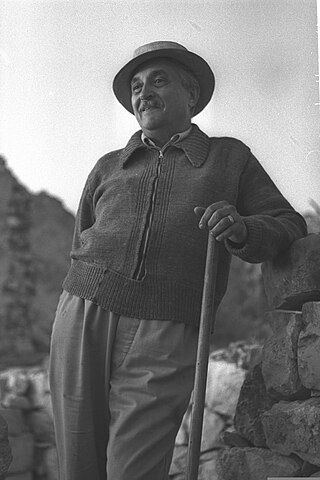
Marcel Janco was a Romanian and Israeli visual artist, architect and art theorist. He was the co-inventor of Dadaism and a leading exponent of Constructivism in Eastern Europe. In the 1910s, he co-edited, with Ion Vinea and Tristan Tzara, the Romanian art magazine Simbolul. Janco was a practitioner of Art Nouveau, Futurism and Expressionism before contributing his painting and stage design to Tzara's literary Dadaism. He parted with Dada in 1919, when he and painter Hans Arp founded a Constructivist circle, Das Neue Leben.

The Bucharest Stock Exchange (BVB) is the stock exchange of Romania located in Bucharest. In 2019, the capitalization of BVB increased 23.4% compared to the previous year, to the value of EUR 37.8 billion. At the end of 2019 there were 83 companies listed on the BVB.
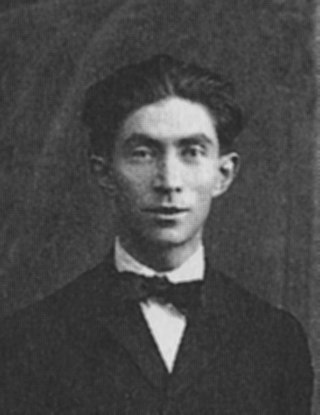
Benjamin Fondane or Benjamin Fundoianu was a Romanian and French poet, critic and existentialist philosopher, also noted for his work in film and theater. Known from his Romanian youth as a Symbolist poet and columnist, he alternated Neoromantic and Expressionist themes with echoes from Tudor Arghezi, and dedicated several poetic cycles to the rural life of his native Moldavia. Fondane, who was of Jewish Romanian extraction and a nephew of Jewish intellectuals Elias and Moses Schwartzfeld, participated in both minority secular Jewish culture and mainstream Romanian culture. During and after World War I, he was active as a cultural critic, avant-garde promoter and, with his brother-in-law Armand Pascal, manager of the theatrical troupe Insula.
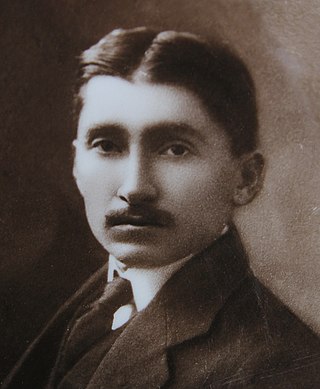
Urmuz was a Romanian writer, lawyer and civil servant, who became a cult hero in Romania's avant-garde scene. His scattered work, consisting of absurdist short prose and poetry, opened a new genre in Romanian letters and humor, and captured the imagination of modernists for several generations. Urmuz's BizarrePages were largely independent of European modernism, even though some may have been triggered by Futurism; their valorization of nonsense verse, black comedy, nihilistic tendencies and exploration into the unconscious mind have repeatedly been cited as influential for the development of Dadaism and the Theatre of the Absurd. Individual pieces such as "The Funnel and Stamate", "Ismaïl and Turnavitu", "Algazy & Grummer" or "The Fuchsiad" are parody fragments, dealing with monstrous and shapeshifting creatures in mundane settings, and announcing techniques later taken up by Surrealism.
Grigore Cugler was a Romanian avant-garde short story writer, poet and humorist. Also noted as a graphic artist, composer and violinist, he was a decorated World War I veteran who served as the Romanian Kingdom's diplomatic representative in various countries before and after World War II. The nephew of poet Matilda Cugler-Poni, he was the author of unconventional and often irreverentious pieces, which have drawn parallels with the work of Alfred Jarry and Urmuz. Their author was celebrated by some of his generation colleagues for his independent voice in Romanian literature.
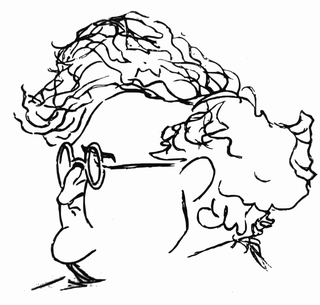
Perpessicius was a Romanian literary historian and critic, poet, essayist and fiction writer. One of the prominent literary chroniclers of the Romanian interwar, he stood apart in his generation for having thrown his support behind the modernist and avant-garde currents of Romanian literature. As a theorist, Perpessicius merged the tenets of Symbolism with the pragmatic conservative principles of the 19th century Junimea society, but was much-criticized over perceptions that, in the name of aesthetic relativism, he tolerated literary failure. Also known as an anthologist, biographer, museologist, folklorist and book publisher, he was, together with George Călinescu, one of his generation's best-known researchers to have focused on the work of Junimist author and since-acknowledged national poet Mihai Eminescu. Much of Perpessicius' career was dedicated to collecting, structuring and interpreting Eminescu's texts, resulting in an authoritative edition of Eminescu's writings, the 17-volume Opere ("Works").

Florin Lucian Cernat is a Romanian former professional footballer who played as a midfielder and playmaker. He made 14 appearances for the Romania national team scoring two goals.

Alexandru Bogdan-Pitești was a Romanian Symbolist poet, essayist, and art and literary critic, who was also known as a journalist and left-wing political agitator. A wealthy landowner, he invested his fortune in patronage and art collecting, becoming one of the main local promoters of modern art, and a sponsor of the Romanian Symbolist movement. Together with other Post-Impressionist and Symbolist cultural figures, Bogdan-Pitești established Societatea Ileana, which was one of the first Romanian associations dedicated to promoting the avant-garde and independent art. He was also noted for his friendship with the writers Joris-Karl Huysmans, Alexandru Macedonski, Tudor Arghezi and Mateiu Caragiale, as well as for sponsoring, among others, the painters Ștefan Luchian, Constantin Artachino and Nicolae Vermont. In addition to his literary and political activities, Alexandru Bogdan-Pitești was himself a painter and graphic artist.

Sergiu Dan was a Romanian novelist, journalist, Holocaust survivor and political prisoner of the communist regime. Dan, the friend and collaborator of Romulus Dianu, was noted during the interwar period as a contributor to Romania's avant-garde and modernist scene, collaborating with poet Ion Vinea on Contimporanul review and Facla newspaper. He was also affiliated with the rival literary club, Sburătorul, and noted for criticizing the communist sympathies of other avant-garde writers. His main works of the 1930s include contributions to the psychological novel, thriller and political novel genres, received with critical acclaim.
N. D. Cocea was a Romanian journalist, novelist, critic and left-wing political activist, known as a major but controversial figure in the field of political satire. The founder of many newspapers and magazines, including Viața Socială, Rampa, Facla and Chemarea, collaborating with writer friends such as Tudor Arghezi, Gala Galaction and Ion Vinea, he fostered and directed the development of early modernist literature in Romania. Cocea later made his name as a republican and anticlerical agitator, was arrested as an instigator during the 1907 peasant revolt, and played a leading role in regrouping the scattered socialist clubs. His allegiances however switched between parties: during World War I, he supported the Entente Powers and, as a personal witness of the October Revolution, the government of Soviet Russia, before returning home as a communist.
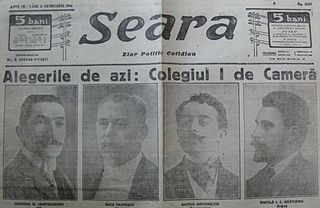
Seara was a daily newspaper published in Bucharest, Romania, before and during World War I. Owned by politician Grigore Gheorghe Cantacuzino and, through most of its existence, managed by the controversial Alexandru Bogdan-Pitești, it was an unofficial and unorthodox tribune for the Conservative Party. Its involvement in politics sparked numerous scandals, the longest of which came during the neutrality period (1914–1916). Strongly anti-Slavic, Seara stood out in that context for supporting the German Empire and Central Powers, and was widely alleged of having been financed by a German propaganda machine. In 1914, it was purchased by German businessmen, but continued to register mediocre success in comparison with its pro-Entente competitors. In late 1916, after Romania decided in favor of the Entente, Seara was disestablished.

The Symbolist movement in Romania, active during the late 19th and early 20th centuries, marked the development of Romanian culture in both literature and visual arts. Bringing the assimilation of France's Symbolism, Decadence and Parnassianism, it promoted a distinctly urban culture, characterized by cosmopolitanism, Francophilia and endorsement of Westernization, and was generally opposed to either rural themes or patriotic displays in art. Like its Western European counterparts, the movement stood for idealism, sentimentalism or exoticism, alongside a noted interest in spirituality and esotericism, covering on its own the ground between local Romanticism and the emerging modernism of the fin de siècle. Despite such unifying traits, Romanian Symbolism was an eclectic, factionalized and often self-contradictory current.
Cernat is a Romanian surname. It originates from the Slavic root ćern-, meaning "black", along with the suffix -at. Černat(a) is a Slavic cognate.

Alexandru Cernat was a Romanian general and politician.
I. M. Rașcu was a Romanian poet of Symbolist verse, cultural promoter, comparatist, and schoolteacher. He is remembered for his participation in the Romanian Symbolist movement: a founder and co-editor, with Alfred Hefter-Hidalgo, of Versuri și Proză magazine, he became one of the leading Symbolist figures in his native city of Iași before 1914. In later years, he lived more discreetly as a scholar and educationist, earning both praise and opprobrium for his sternness and erudition.
Lucian Boz was a Romanian literary critic, essayist, novelist, poet and translator. Raised in Bucharest, he had a lawyer's training but never practiced, instead opting for a career in journalism and literary criticism. An active participant in the 1930s cultural scene, he theorized an empathetic and "enthusiastic" approach to literature, which was in tune with the avant-garde tendencies of his lifetime. After a stint editing the review Ulise in 1932–1933, he became a contributor to more major newspapers, including Adevărul, Cuvântul Liber, and Vremea.

Ion Vinea was a Romanian poet, novelist, journalist, literary theorist, and political figure. He became active on the modernist scene during his teens—his poetic work being always indebted to the Symbolist movement—and first founded, with Tristan Tzara and Marcel Janco, the review Simbolul. The more conservative Vinea drifted apart from them as they rose to international fame with the Dada artistic experiment, being instead affiliated with left-wing counterculture in World War I Romania. With N. D. Cocea, Vinea edited the socialist Chemarea, but returned to the international avant-garde in 1923–1924, an affiliate of Constructivism, Futurism, and, marginally, Surrealism.
Eugeniu Ștefănescu-Est was a Romanian poet, prose writer and visual artist, professionally active as a lawyer. He belonged to the local Symbolist movement from ca. 1900, when he also became an associate and disciple of Ion Minulescu. Before Worled War I, while he took up jobs as a magistrate, his synaesthesic and extrovert lyrical pieces earned attention, while his cartoons were taken up in magazines such as L'Assiette au Beurre and Furnica. He abandoned the verse genre by the 1920s, earning attention as the author of fairy tales, and then also trying his hand as a novelist. Eventually losing his eyesight, Ștefănescu-Est spent the last thirty years of his life in anonymity, looked after by his daughter.
Stephan Roll was a Romanian poet, editor, film critic, and communist militant. An autodidact, he played host to the Romanian avant-garde at his father's dairy shop, publishing his work in short-lived reviews and in two volumes of poetry. As one of the editors of the magazine unu, he turned from Constructivism, Futurism and jazz poetry to the more lyrical format of Surrealism. Roll's political radicalism seeped into his avant-garde activity, and produced a split inside the unu group; Roll's faction discarded Surrealism in favor of proletarian literature, and affiliated with the underground Romanian Communist Party.
References
- ↑ "Archived copy" (PDF). Archived from the original (PDF) on 2013-10-22. Retrieved 2013-10-21.
{{cite web}}: CS1 maint: archived copy as title (link) - ↑ "cartea romaneasca / catalog / autori". www.cartearomaneasca.ro. Archived from the original on 2008-09-18.